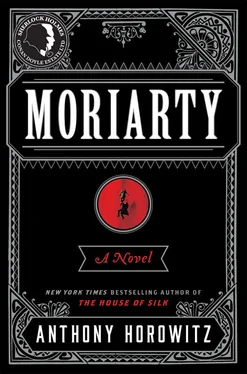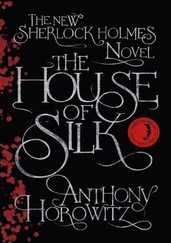Clayton returned. ‘Mr Lavelle will see you in his study.’
We were shown into a room filled with books that had never been read—they had a musty, unloved look about them. As we entered, a man glared at us from behind a monstrous Jacobean desk and for a moment, I thought he was about to attack us. His appearance was that of a prizefighter even if he did not dress the part. He was completely bald with an upturned nose and very small eyes that were set deep in his face. He was wearing a boldly patterned suit that fitted him tightly and he wore a ring on almost every finger of both his hands, the gaudy stones fighting with each other. One might have been acceptable but the overall effect was tawdry and strangely unpleasant. The folds of his neck had bunched up as they sought a way to enter his collar and I knew him at once. Scotchy Lavelle. It seemed strange to be meeting him for the first time in the surroundings of a suburban house, thousands of miles from New York.
There were two seats opposite the desk and although he had given us no invitation, we took them. It signalled at least our determination to stay.
‘Now what is all this?’ he demanded. ‘Inspector Jones of Scotland Yard? What are you doing here? What do you want? I’ve got nothing to say to you.’ He noticed me. ‘And who’s he with you?’
‘My name is Frederick Chase,’ I replied. ‘I’m with the Pinkerton Agency in New York.’
‘Pinkerton’s! A ragbag of bums and back-stabbers. How far do I have to go to be away from them?’ He was using the coarse language of the lower Manhattan streets. ‘There’s no Pinkerton’s over here and I won’t speak to you, not in my own crib, thank you very much.’ He turned to Jones. ‘Scotland Yard, you say! I have no business with you either. I’ve done nothing wrong.’
‘We are looking for an associate of yours,’ Jones explained. ‘A man called Clarence Devereux.’
‘I don’t know the name. I never heard it. He’s no associate. He’s nothing to me.’ Lavelle’s small, pugnacious eyes dared us to challenge him.
‘You did not travel with him to England?’
‘Didn’t you just hear me? How could I travel with someone I never met?’
‘Your accent tells me that you are American,’ Jones tried. ‘Can you tell me what brings you to England?’
‘Can I tell you? Maybe I can—but I don’t know why the blazes I should.’ He jabbed a single finger towards us. ‘All right, all right. I’m a company promoter. Nothing wrong with that! I raise capital. I offer opportunities for investment. You want shares in soap, candles, bootlaces or what have you, I’m your man. Maybe I can interest you in an investment, Mr Jones? Or you, Mr Pinkerton? A nice little gold mine in Sacramento. Or coal and iron in Vermissa. You’ll get a better return than a catch-pole’s salary, I can promise you.’
Lavelle was taunting us. We both knew the truth of his connection to Devereux and he was well aware of it. But with no evidence of any crime, planned or committed, there was little we could do.
Inspector Jones tried a second time. ‘Yesterday I followed a young man—a child—to this house. He was fair-haired, dressed in the uniform of a telegraph boy. Did you meet with him?’
‘Why would I have done that?’ Lavelle sneered. ‘I may have received a telegraph. I may not. I don’t know. You’ll have to ask Clayton.’
‘I saw the boy come into the house. He did not leave.’
‘Sitting there with your peeper, were you? Measuring me? Well, there’s no squeakers here, telegraph or otherwise.’
‘Who resides here?’
‘What’s it to you? Why should I tell you that? I’ve already said. I’m a respectable businessman. You can ask about me at the legation, why don’t you? They’ll vouch for me.’
‘If you do not wish to assist us, Mr Lavelle, we can return here with a warrant and a dozen officers. If you are as you say you are, then you will answer my questions.’
Lavelle yawned and scratched the back of his neck. He was still scowling at us but I could see that he had weighed up his options and knew he had no choice but to give us what we demanded.
‘There are five of us,’ he said. ‘No, six. Myself and my woman, Clayton, the cook, the maid and the kitchen boy.’
‘You said there were no children here.’
‘He’s no child. He’s nineteen. And he’s a ginger.’
‘We would still like to meet him,’ I interposed. ‘Where is he?’
‘Where do you think you’ll find a kitchen boy?’ Lavelle snarled. ‘He’s in the kitchen.’ He tapped the fingers of one hand against the desk, making the jewelled rings dance. ‘I’ll fetch him for you.’
‘We will go to him,’ I said.
‘Want to nosey around, do you? Very well. But after that you can hop the twig. You have no reason to be here, I tell you, and I’ve had enough of the both of you.’
He rose up from behind the desk, the movement reminding me of a swimmer breaking the surface of the sea. As he revealed himself to us, he seemed to shrink in size, with the huge desk looming over him. At the same time, it seemed to me that the lurid colour and tight fit of his suit along with his surfeit of jewellery only diminished him further.
He was already moving to the door. ‘This way!’ he commanded.
Like supplicants who had just been interviewed for a menial position in his household, Jones and I followed. We recrossed the hall and this time we were met by a woman coming down the stairs, a great deal younger than Lavelle and, like him, dressed extravagantly, in her case in swathes of crimson silk that hugged her ample form rather too closely. Her neckline was low enough to have caused a commotion had she walked onto the streets of Boston and her arms were bare. A string of diamonds—real or paste, I could not say—hung around her neck.
‘Who is it, Scotchy?’ she asked. She had a Bronx accent. Even at a distance, I could smell soap and lavender water.
‘It’s no one,’ Lavelle snapped, doubtless annoyed that she had betrayed him by using the name by which he was known to myself and to many law enforcers across America.
‘I’ve been waiting for you.’ She had the whining voice of a schoolgirl dragged unwillingly to class. ‘You said we were going out…’
‘Shut the potato trap and give the red rag a holiday.’
‘Scotchy?’
‘Just get upstairs and wait for me, Hen. I’ll tell you when I’m ready for you.’
Pouting, the woman hitched up her skirts, turned and ran up the way she had come.
‘Your wife?’ Jones enquired.
‘My convenience. What’s it to you? I met her in a goosing slum and brought her with me when I travelled. This way…’
He led us across the hall and through a doorway into the kitchen, a cavernous room where three people were busily occupied. Clayton had laid out the silver, which he was polishing, each implement receiving the most careful attention. The ginger-haired kitchen boy, a lanky, pockmarked lad who did not resemble Perry in the least, was sitting in the scullery, peeling vegetables. A rather severe woman with grey hair and an apron was stirring a large pot on the cooking range and the whole room was filled with the smell of curry. Every surface in the kitchen had been scrubbed clean. The floor, black and white tiles, was immaculate. Two large windows and a glass-panelled door looked out into the garden, providing natural light, and yet, even so, I had a sense that this was a gloomy place. As in the rest of the house, the windows were barred, the door locked. It would be easy to believe that these people were being held here against their will.
They stopped what they were doing when we came in. The kitchen boy got to his feet. Lavelle stood in the doorway, his broad shoulders almost touching the frames. ‘These men want to talk to you,’ he muttered, as if no further explanation was required.
Читать дальше












